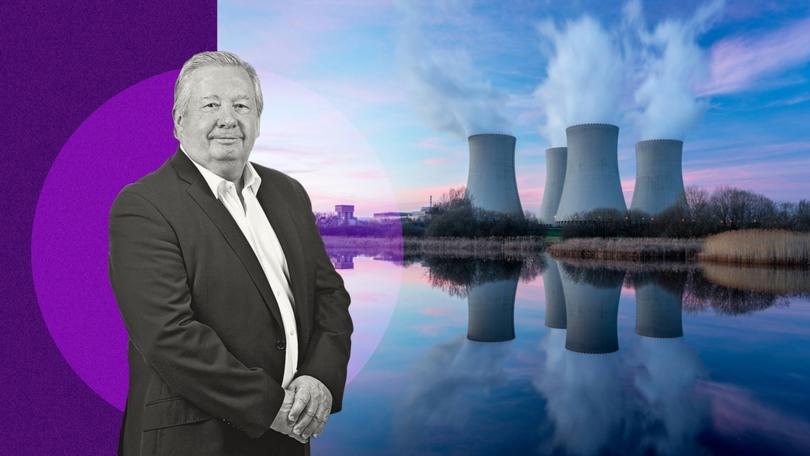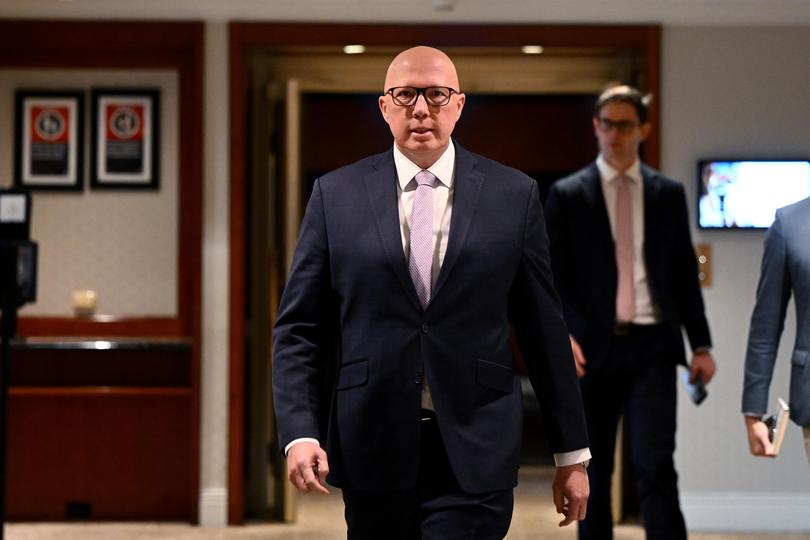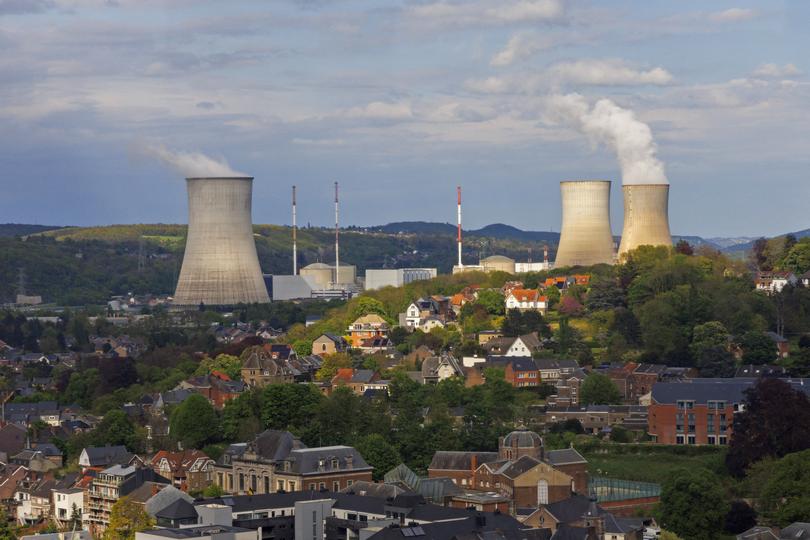PAUL MURRAY: Why it’s ridiculous to regard nuclear power as unachievable
PAUL MURRAY: It is simply ridiculous to regard nuclear power as unachievable when so many other countries have achieved it. There are 440 reactors operating now in 31 countries.

We are about to get a Federal election campaign that will be a true test of ideas. That hasn’t happened for a while.
Peter Dutton’s Coalition is offering Australians a choice between an electricity system based on the same zero-emissions energy source that has successfully powered countries like France for decades or one reliant on intermittent wind and solar, backed by batteries and green hydrogen, that exists nowhere.
The immediate question is whether Dutton and his coalition colleagues are capable of selling such a grand vision.
Sign up to The Nightly's newsletters.
Get the first look at the digital newspaper, curated daily stories and breaking headlines delivered to your inbox.
By continuing you agree to our Terms and Privacy Policy.The Liberals have ignored the potential of nuclear energy for decades. They are responsible for the ridiculous Federal ban on its use and do not have a strong recent track record in winning difficult political debates.
So even though this might be the right policy for the times, it comes with huge risks.
Facing a looming election, Dutton could have played safe and hoped that our rapidly shrinking Prime Minister all but disappeared by polling day.
He could have adopted the strategy of Kevin Rudd in 2007 and Anthony Albanese himself in 2022 by rolling into a little ball and pretending to be something else.
Dutton has chosen the more difficult path to The Lodge.

A distinct point of difference on a critical issue. Highlighting Albanese’s weakness that is now emerging in opinion polling.
But the even bigger question is whether we are up to this challenge as a nation. Do we still have the fortitude to make big decisions about our future?
Has the long pursuit of a fashionable perception of “diversity” made us unable to unite on the big issues we face together?
Are we so weakened by a debilitating, but misplaced, fear of environmental doom that we can’t clearly see the inherent failings in a reliance on unreliable forms of renewable energy?
The nuclear debate will not be easy. It is complex, loaded with mind-numbing detail and requires effort to distinguish scare-mongering from what is factual.
It also questions a modern orthodoxy that renewables backed by batteries can provide plentiful reliable baseload energy, which is demonstrably untrue.
Dutton needs to keep steadily adding detail to the debate, particularly on build costs and likely power tariffs. Too much, too soon overloads people.
And he needs to keep his nerve in confronting a hysterical fear campaign that will be fought on many fronts.
Our post-war prosperity came from cheap, reliable, widely-available energy. Many assume that will continue after a period of adjustment to renewables.
Even the term “post-war” is now fairly meaningless to recent generations who have no understanding of the much lower standard of living of their forebears, even the derided baby boomers.
And they appear similarly unaware of how theirs’ could collapse when fossil fuels are removed from the energy mix without a stable baseload replacement.
A further big question posed by Dutton’s audacious plan will be the role of the media in such an important public debate.
Anyone who watched Sarah Ferguson’s breathless, hypertensive and outright rude coverage on ABC TV’s 7.30 on Wednesday might think the world was ending.
Talk about angst. She wasn’t interviewing; she was having a personal nuclear meltdown.
A dispassionate observer might ask: Why is Sarah so agitated? It certainly wasn’t because of the demeanour of her unfortunate subject, Coalition energy spokesman Ted O’Brien, calmly trying to outline the policy.
There is a way to debate nuclear energy civilly. You won’t see it on the ABC.
Or probably even in the parliament, given the early reaction from Albanese and his colleagues who took the Chicken Little option from the outset.
The bottom line remains this: Why are 10 countries as diverse as Turkey, Japan, Egypt and Bangladesh currently building nuclear reactors?
China is installing 28,971MW of new nuclear generation — equal to half of Australia’s total electricity output. It already has 55 reactors, providing twice our total national electricity generation.
On something as strategic as energy, I’d be backing China.
Since 2022, nuclear reactors have come on stream in America (2), United Arab Emirates (2), China (2), India, Pakistan, Slovakia, Belarus, Finland and South Korea.

World Nuclear Association reports show the shortest build was a Chinese-designed 1014MW plant in Pakistan which was up and running in 69 months – less than six years – with two other Chinese facilities taking 72 and 81 months.
“Despite the large variation in reactor construction times, the median construction time for reactors grid-connected in 2022 was little changed from that in 2021, being one month longer, at 89 months,” the World Nuclear Association says.
The UAE’s 1310MW Barakah 3 plant — built by Korea Electric Power Corporation — took eight years and the 1340MW South Korean plant, Shin Hanul 2, took just shy of 10 years.
In 2010, I toured a nuclear power facility in South Korea, nestled in a quaint, but densely populated area, and had the chance to talk to some of the residential neighbours. They welcomed the plant.
I lived within sight of a nuclear plant in France in the 1980s, driving past it often on the way to shop in a neighbouring city. Few took any notice that France got 70 per cent of its power from nuclear.
The UAE’s adoption of nuclear energy should interest us amid the argument that Australia couldn’t build nuclear plants because we have no experience with the technology. Neither did they.
The Barakah complex is the first commercial nuclear power station in the Arab world, comprised of four 1400MW reactors, all State-owned, designed to provide 25 per cent of the Emirates’ electricity.
In December 2009, the Emirates awarded the Koreans a US$20 billion contract to build and operate the plant. The first unit was operational by April 2021 and the fourth came online in March this year with a completion cost said to be US$24.4 billion.
Which would make it about US$6 billion for each 1400MW reactor — that’s A$9 billion a pop.
Consider this: Australia is prepared to spend between $268b to $368b from now and the mid-2050s to get a fleet of eight nuclear submarines. Yes, that’s the cost of defence.
At the top-end estimate, it will be about $46b for each submarine delivered.
Surely a suite of seven nuclear power plants to underpin our national energy future is a pretty good investment at an indicative total cost from the UAE experience of maybe $70b?
The UAE chose nuclear after an evaluation of comparable total costs that put nuclear at $108.4/MWh against $221 for offshore wind and $261 for concentrated solar power.
Part of the misinformation spread by ideological opponents of nuclear energy is that the world is turning away from the source, with claims its share is at a 40-year low and declining.
“Nuclear generation supplies around one-quarter of the world’s clean electricity, second only to hydropower,” World Nuclear Association Director-General Sama Bilbao y León said in her 2023 report.
“However, with output totalling 2545 TWh, generation in 2022 was just over 100 TWh lower than in 2021. Three events in Europe contributed much to this reduction.
“First, a program of welding repairs, as well as other outages, reduced generation by 81TWh in France. Second, the closure of three of Germany’s remaining six reactors at the end of 2021 deprived that country of a source of reliable low-carbon generation and prolonged its continuing use of fossil fuels.
“Third, the war in Ukraine resulted in the shutting down of the six units at the Zaporizhzhia nuclear power plant. In combination, these three events resulted in a reduction of electricity output in France, Germany and Ukraine of 134 TWh, compared to 2021.”
Some business sector opposition to nuclear power in Australia can be sourced to gas-fired generators, the big beneficiaries of the closure of coal-fired power plants.
Synergy, for example, has a big investment in gas generation. So, unsurprisingly, it’s a critic of nuclear. And pandering to its political masters.
But it would be wrong to consider gas as anything other than a transition fuel on the way to net zero because burning it releases around half the carbon emissions of coal.
While gas is crucial to maintaining baseload power as coal declines, its increased use will reduce the emissions savings.
Nuclear offers the chance to break with the carbon cycle. And gas is too valuable as a petrochemical to burn. We will need it for medicines.
It is simply ridiculous to regard nuclear power as unachievable when so many other countries have achieved it. There are 440 reactors operating now in 31 countries.
But look at Labor’s plan. It ends up hypothetically plugging the yawning renewable gaps with green hydrogen, which doesn’t exist commercially.
As even this column shows, there is a bewildering amount of information that will be thrown at Australians in the nuclear debate.
If the reaction of most people is to eventually glaze over, either overwhelmed or just bored, Dutton is shot.
And so are we.
Originally published on The Nightly
